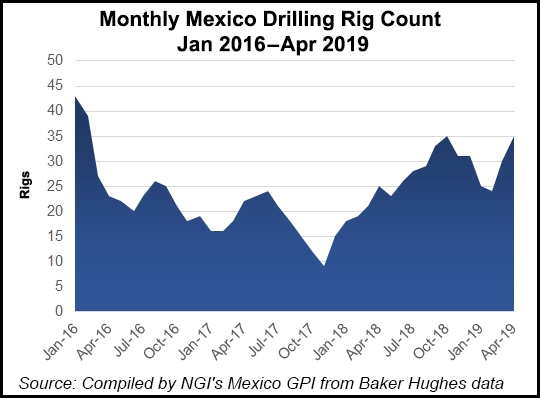NGI The Weekly Gas Market Report | E&P | NGI All News Access
Mexico Upstream Investment Advances as Industry Pleads Case to Revive Auctions
Private sector companies in Mexico are urging the new government to reconsider new oil and gas auctions as projects awarded during the previous administration continue to advance.

Earlier this month, Alberto de La Fuente, president of the Asociación Mexicana de Empresas de Hidrocarburos (AMEXHI), or the Mexican Association of Hydrocarbons Companies, met with the energy committee of Mexico’s senate to make their case.
De La Fuente said AMEXHI members expect to produce about 280,000 b/d of crude oil by the end of President Andrés Manuel López Obrador’s term in 2024, up from 31,000 b/d currently.
He warned, however, that this production will begin to fall starting in 2027 unless the government resumes upstream bid rounds.
López Obrador has suspended the rounds, which were made possible by Mexico’s 2013 constitutional energy reform. The president has criticized the reform as a usurpation of Mexico’s energy sovereignty.
De La Fuente highlighted that exploration and production (E&P)investments by the private sector have totaled $7.759 billion since the reform, and that the government take of income generated by the bid round contracts averages around 74%.
While the rounds remain suspended until further notice, projects already awarded through previous tenders are being developed, as shown by a series of investment approvals on Tuesday by upstream regulator Comisión Nacional de Hidrocarburos (CNH).
The CNH on Tuesday approved two multi-well exploration plans that call for combined investment of up to $246 million.
The plans were submitted by Jaguar Exploración y Producción 2.3 SAPI and Eni México S de RL de CV, which are subsidiaries of Jaguar Exploración y Producción and Eni SpA, respectively.
Jaguar obtained approval for a four-well exploration drilling campaign targeting four onshore natural gas prospects with combined prospective resources of 44.21 Bcf in the Sureste Basin near Villahermosa, Tabasco state.
Jaguar plans to invest approximately $20.46 million in the drilling program, which will take place between 2019 and 2020. Jaguar and partner Sun God Resources secured 11 of the 24 gas-rich blocks on offer through CNH’s Round 2.2 and Round 2.3 bidding process conducted in 2017.
At the same CNH session, Eni México secured approval for a shallow water exploration plan that would entail investment of $142.7 million between 2019 and 2023 under a base scenario, or up to $226.4 million during the same span under a contingent scenario.
The base scenario includes the drilling of two exploration wells, while the contingent scenario would add a third.
The plan pertains to the CNH-R03-L01-G-CS-01/2018 contract awarded to Eni and joint venture partner Lukoil Upstream Mexico S De RL de CV, via Mexico’s Round 3.1 tender in 2018. The latter firm is a subsidiary of Russia’s owned Lukoil.
Eni holds a 75% operating interest in the shallow water block off the coast of Veracruz state in the Sureste Basin, with Lukoil controlling the remaining nonoperated 25%.
Eni holds operating stakes in five E&P blocks in Mexico’s Sureste Basin. The farthest along in terms of development is shallow water Area One, awarded in 2015, where Eni plans to reach a production plateau of 90,000 b/d oil and 65 MMcf/d gas by 2021.
CNH also gave the green light to BHP Billiton Petróleo Operaciones de México, S De RL de CC, a subsidiary of BHP, to drill the ultra-deepwater Trion-3Del delineation well at the Trion prospect in the Perdido Fold Belt.
BHP holds a 60% operating stake in Trion, with the remaining nonoperated interest held by Pemex Exploración y Producción (PEP), the upstream subsidiary of national oil company Petróleos Mexicanos (Pemex). BHP obtained its stake in Trion through a farmout tender conducted by Pemex in 2016.
The objective of the well is to evaluate the gas-oil contact at Trion, which primarily targets 34-degree and 36-degree API light crude.
CNH also approved the Popte-1EXP onshore exploration to be drilled by PEP, with the objective of striking 40-degree API super-light crude oil.
In related news, Renaissance Oil Corp. said this month it has completed a 17-well drilling program at the Amatitlán block targeting the Chicontepec tight sand formations in the Tampico-Misantla basin in western Mexico. Renaissance and a local subsidiary of Lukoil share an integrated oilfield services (OFS) contract at Amatitlán, which is operated by Pemex.
In addition to the Chicontepec wells, Renaissance and Lukoil drilled a 3,500 meter (11,483 foot) appraisal well at Amatitlán testing the deeper Jurassic shale formations, which Renaissance has compared to the Eagle Ford Shale in South Texas.
“Renaissance and Lukoil are negotiating a development plan on the Amatitlán block for the commercialization of all prospective zones, with particular emphasis on the Upper Jurassic formations,” Vancounver, Canada-based Renaissance said.
“Negotiations include the migration of the Amatitlán [services contract] into a contract of exploration and extraction, pursuant to the constitutional amendments of Dec. 20, 2013, reforming the Mexican energy industry.”
López Obrador has expressed opposition to hydraulic fracturing, but has not pursued a formal ban of the drilling technique.
© 2024 Natural Gas Intelligence. All rights reserved.
ISSN © 2577-9877 | ISSN © 2577-9966 | ISSN © 1532-1266 |
